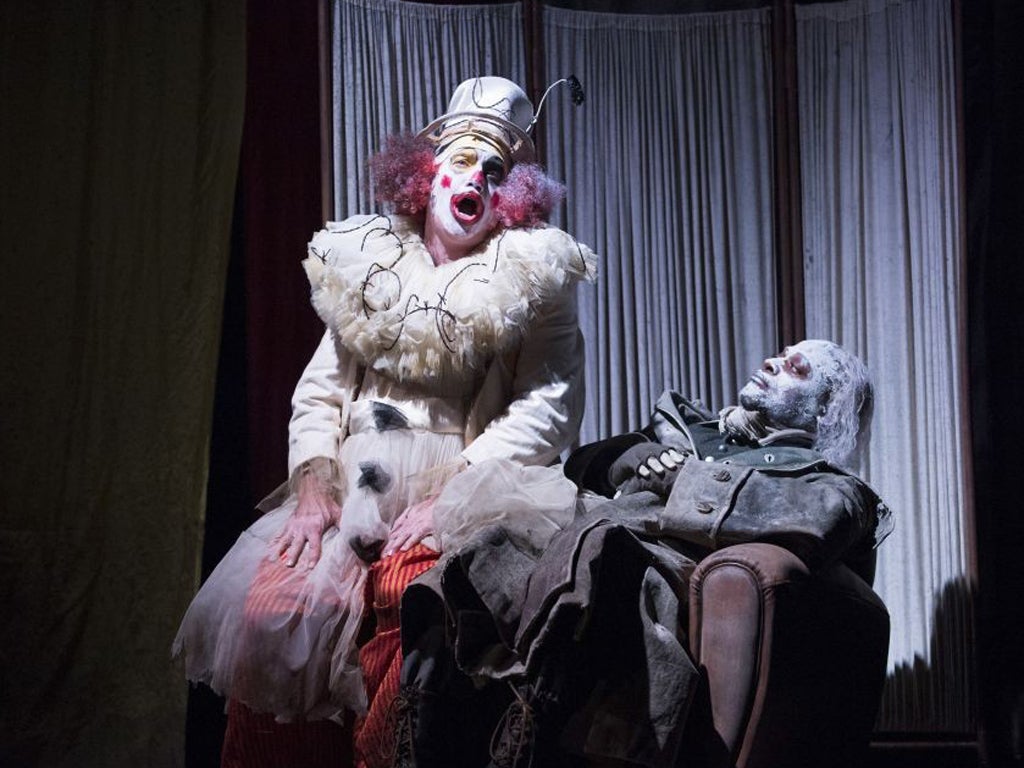The Emperor of Atlantis/ Albert Herring, Linbury Studio, London Tosca, King's Head Theatre, London
From within the death camp, a picaresque story of redemptive love

Your support helps us to tell the story
From reproductive rights to climate change to Big Tech, The Independent is on the ground when the story is developing. Whether it's investigating the financials of Elon Musk's pro-Trump PAC or producing our latest documentary, 'The A Word', which shines a light on the American women fighting for reproductive rights, we know how important it is to parse out the facts from the messaging.
At such a critical moment in US history, we need reporters on the ground. Your donation allows us to keep sending journalists to speak to both sides of the story.
The Independent is trusted by Americans across the entire political spectrum. And unlike many other quality news outlets, we choose not to lock Americans out of our reporting and analysis with paywalls. We believe quality journalism should be available to everyone, paid for by those who can afford it.
Your support makes all the difference.The world turns upside down in English Touring Opera's production of Viktor Ullmann's The Emperor of Atlantis, as a quartet of singers dressed in the drab overcoats of the dispossessed perform a Bach cantata to an onstage audience of three. Who are these freakish, tattered, grease-painted listeners? Death, the Emperor and the Harlequin: principal players in a bitter satire on war and its bloated bureaucracy.
The Bach cantata serves as prologue and counterpoint to the opera, its graceful suspensions and lilting alleluias rearranged for Ullmann's tart palette of saxophone, trumpet, clarinet, flute and string quintet. Written in Theresienstadt concentration camp, The Emperor of Atlantis was premiered more than 30 years after Ullmann and his librettist Peter Kien were sent to their deaths in Auschwitz. Rage and pity dance and duel in Kien's libretto while Ullmann's music darts from the adamantine lyricism of Berg and Zemlinsky to a cabaret lampoon of "Deutschland über Alles" and on to a setting of Bach's chorale "Ein feste Burg", half-lullaby, half-requiem.
Director James Conway's decision to elide the two works is scrupulously realised. Death rears in affront at the text of the cantata, its translation produced on cards by the weary Harlequin. As the four singers unbutton their coats to become Ullmann's Soldier, Loudspeaker, Drummer Boy and Maiden, the Emperor announces universal war. Overworked and out of sorts, Death goes on strike. Unable to kill each other, the Soldier and Maiden fall in love. Unable to realise his ambition, the Emperor agrees to die if Death resumes his work, which he does as the quartet reassembles, stripped to their underwear in a clear allusion to Auschwitz. Sung with passion, wit and clarity, this is English Touring Opera at its boldest.
Albert Herring, Britten's comedy of moral panic in a Suffolk village, is deftly drawn in Christopher Rolls's period-costume production, again for ETO. Led by Jennifer Rhys-Davies (Lady Billows), the committee of grotesques who crown Mark Wilde's mortified Albert as May King are softened by unspoken desires. Rosie Aldridge's forceful Florence wilts in sapphic adoration of Lady Billows, while Charles Johnstone's Mr Gedge trembles with love for flighty Miss Wordsworth. As the only happy couple, Charles Rice's vain, handsome Sid and Martha Jones's Nancy provide a better model. The archetypes remain true, the orchestration fresh as a daisy under Michael Rosewell.
OperaUpClose's Tosca relocates Puccini's shabby little shocker to Stasi-controlled East Berlin. Director Adam Spreadbury-Maher's translation has moments of deliberate and inadvertent humour (Tosca: "I'll vomit!", Scarpia: "That's just the way I like you!"). A photograph of Erich Honecker stands in for the statue of the Madonna and a fruit knife replaces the diva's death-plunge. Under Elspeth Wilkes's musical direction, Becca Marriott (Tosca), Edward Hughes (Cavaradossi), James Harrison (Scarpia) and Miles Horner (everyone else) sob, snog, leer and roar their hearts out to pungent effect.
ETO, West Road Concert Hall, Cambridge (01223 300085) from Tue; 'Tosca' (020-7478 0160) to 10 Nov
Critic's Choice
Cellist Thomas Demenga plays Bach's first and sixth solo suites, Zimmermann's cello sonata and his own work at London's Wigmore Hall (Wed). Thomas Zehetmair and Northern Sinfonia continue their survey of The Romantic Symphony with the second symphonies of Schumann and Brahms, at The Sage, Gateshead (Fri).
Join our commenting forum
Join thought-provoking conversations, follow other Independent readers and see their replies
Comments